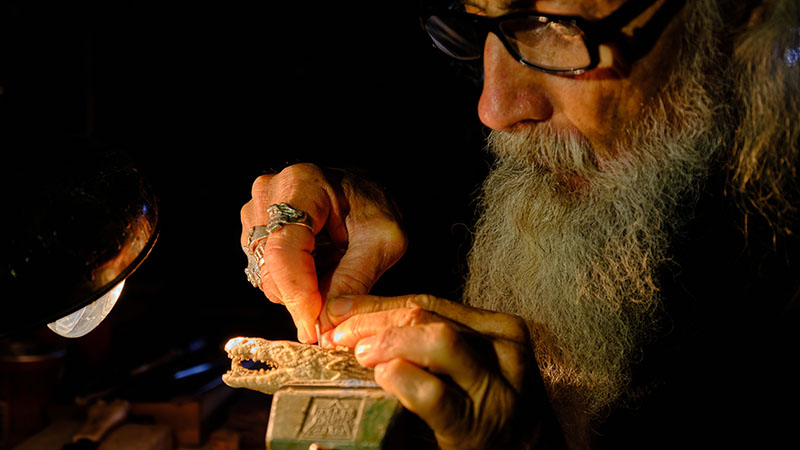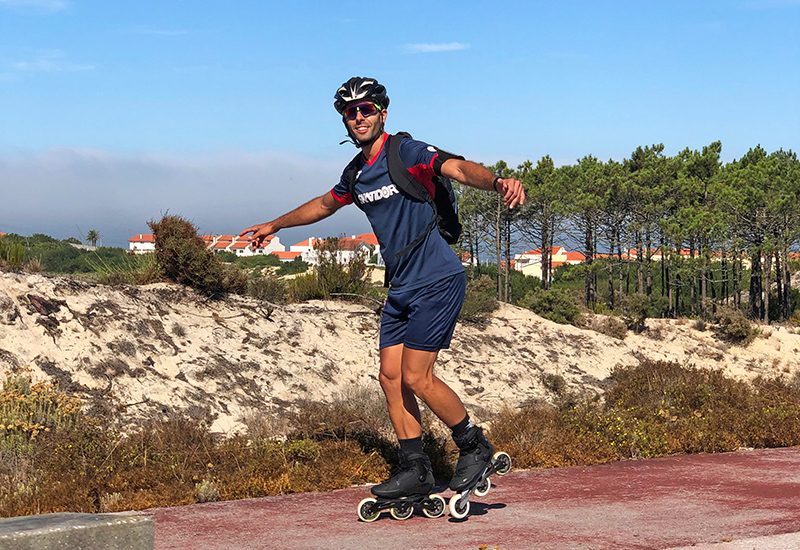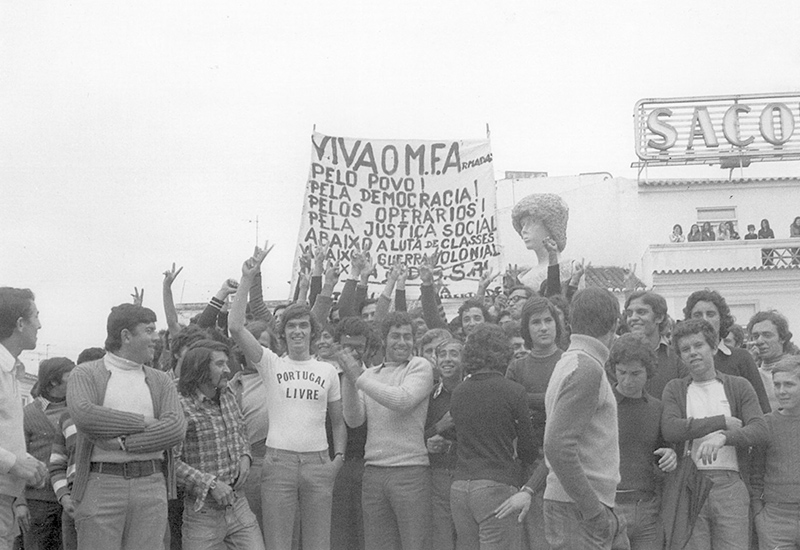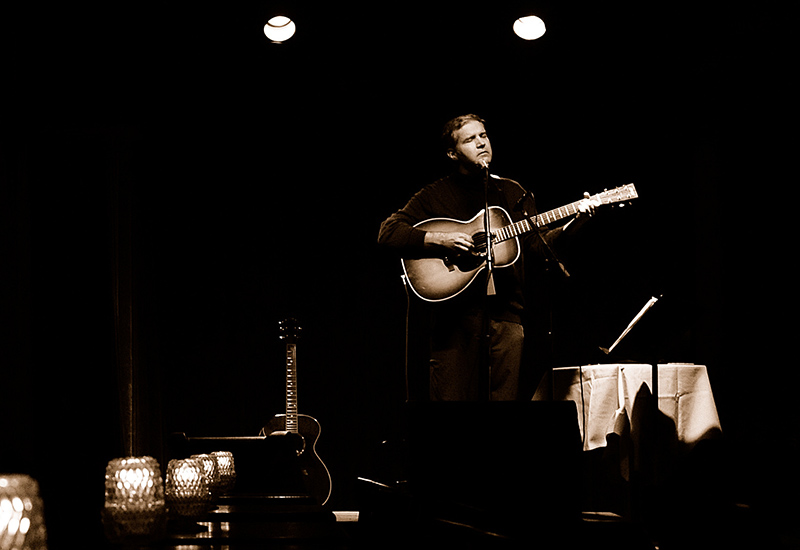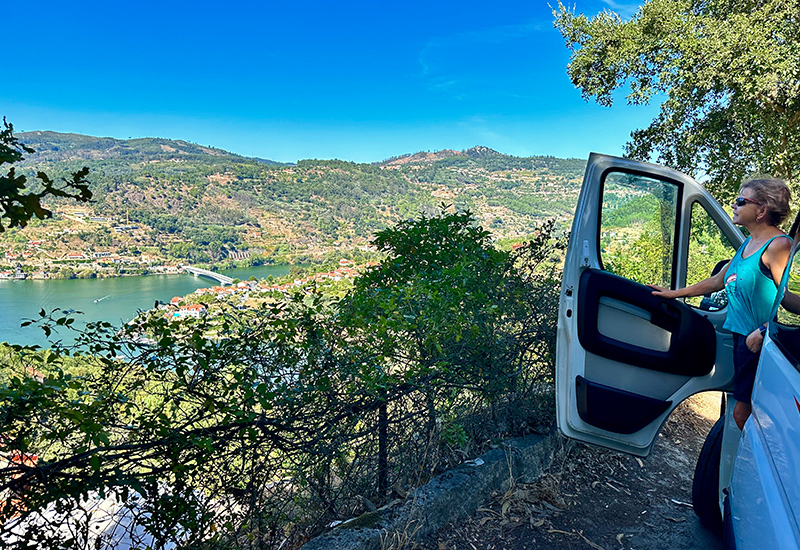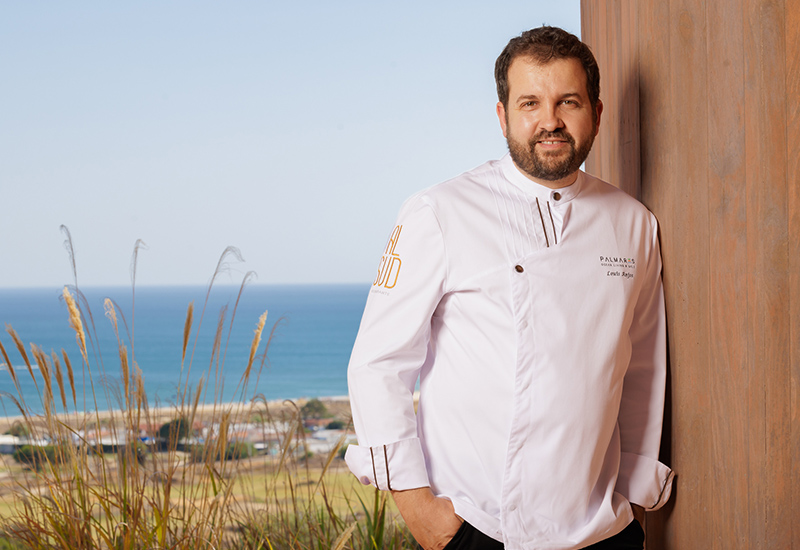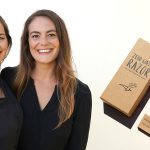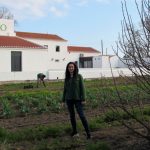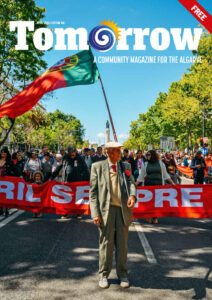It might sound like a contradiction in terms to discover inner peace through knives, but Hubertus ‘Hubs’ Nees has done just that. In an extraordinary life that has taken him on a fast road from hardcore biker to yogi and now world-renowned master craftsman, Hubs has finally achieved balance – in his mind and with his knives.
Photography Emerald Media
My story begins in Hubs’ workshop near Barão São João. A sprawling smallholding, he has owned this sanctuary of privacy with only the sound of birds for over 30 years. The workshop is the epicentre of Algarve Knives. In this atelier, highly crafted, fixed-blade knives are designed and created in what Hubs sees as a meditative, artistic and unique process.
He begins his tour by excitedly showing me objects that he unwraps or pulls out of boxes. Mother of pearl shells – 30,000-year-old Mammoth ivory and bones from Siberia – water buffalo horns from Thailand and meteorites are gifts, found in the landscape or bought at specialist auctions. He is like a kid in a sweet shop showing me his treasures, all of which he delights in for their uniqueness and beauty.
He can, though, also transform seemingly mundane objects into something magical. He shows me how a pine cone cut in half and set into acrylic takes on a mystical beauty. “I see possibilities in so many objects,” he explains.
When Hubs starts to create a knife, he switches off his phone and the music he normally listens to while working. His craft arises from the flames like a phoenix from the ashes. Born from life experiences, discoveries and imagination. They are dreamt out of a meditative state where he becomes totally immersed in the gift of creativity – absorbing the energy from the external objects and once more creating life from something that was dead.

A mammoth that died 30,000 years ago is reincarnated in the exquisite carving and elegantly crafted into a new being that appears to live and breathe. A meteorite that burnt through space at the dawn of time is polished and elegantly fitted into the butt. A humble pine cone from an Algarve wood transforms into magical shapes once manipulated by Hubs’ hands into a breathtaking handle.
His workshop is also full of his other passion, upcycled objects for the home. He has different houses around the world which he fills with interesting objects. He is currently creating his dream stone house in the Monchique hills, bursting with handmade novelties, like old cork bark set with glass stones as uplights, an old metal iron used as a lamp base and furniture carved from driftwood. His former motorcycle helmets hang outside the workshop overflowing with plants in their new incarnation as hanging baskets. “I burst with ideas all of the time. I love old things that have a soul, not new ones made without any care. It is incredibly satisfying to breathe art into functional objects.”


Outside his workshop is his forgery. Created from old car wheel rims, he forges his knife blades here in the dark. This, he says, is the only way that you can see the colour of the flames to judge the temperature. He uses only the best materials, mainly Damascus steel which is up to ten times more expensive than normal knife steel. Mesmerising patterns from decorative swirls to feathered shapes or waves are created in his more elaborate pieces from the layers of steel. He shows me one example with 220 layers built up to create a mirage of reflections. “I have even used old motorcycle chains – you can see the different layers of the original item. Then I forge and grind it down to make it smooth.” He demonstrates how successful his technique is when he uses a blade to cut into a marble surface.
We can only understand how these exhibitions in craftsmanship came to fruition if we take a trip back into Hubs’ past. However, it is difficult to put his past into any kind of chronology as he tells me that he has no idea what year he moved to Portugal as he only lives in the present and never looks back at the past – he does know, however, that it was over 30 years ago.
Perhaps it is irony or fate that Hubs came to craft knives, being named Hubertus after the patron saint of hunting. His father was a professional hunter, and as a boy, he would go with him to his private hunting grounds in the south of Germany. Despite this, it was an unhappy family dynamic that culminated in boarding school in Baden Baden. Maybe to find freedom, at 13, he bought a broken motorcycle and started to ride it frequently, ending up in court for driving without a licence. At 16, with a driving licence, he decided to stay on the right side of the law and stuck with 50cc modified mopeds, which he and his friends used to explore the black forest and the Rhine valley, camping and fishing.


“While sleeping outside beside the fire, I got the first look inside the world of useful knives. I learned first-hand the importance of quality and balance for a good knife in daily use.” One of the first knives he crafted was a simple hunting knife for his father, which he still keeps in his workshop.
After leaving school, he was keen to fly the nest and so he stayed at his Uncle’s ranch in Canada, working with horses. He also lived in the US, spending time with the native Indians. It was maybe his lack of parental bonds that led him into another family. “I gravitated towards bikers, gangs and pimps, but what made me attracted to them was the support and brotherly love they showed to each other.” He confesses to a life filled with booze, cannabis and often being on the wrong side of the law. “I have had quite a colourful life.”
He increasingly felt a need to leave his homeland, which he found “too stressful”, and he found Portugal on a map when a friend told him about the Algarve. For years he would travel to Sagres in his van with a girlfriend and spent many vacations there. “At that time, it was so cheap and there was no one to stop you camping on the beaches, so I just spent some time here to save money and enjoy the free life.” Later, he bought the land neighbouring what is now the Espiche golf course and adopted Portugal as his country of residence.
It was his love of motorcycles, however, that led him to his successful business enterprise in repurposing Harley Davidsons. For years his artistic talents were bequeathed to the biking community.

As well as rebuilding bodywork and engines, he designed accessories for bikes that were often then mass-produced. His motorcycle shed next to the workshop displays an impressive collection of bikes as well as custom-made parts for Harley enthusiasts, such as light casings moulded into women’s heads, speedometers and sculpted body parts. This led him to a successful business with six Harley Davidson orientated customisation shops in Portugal.
When he was 50, intuition and a chance meeting with an old friend persuaded him that he needed to distance himself from the hardcore biking side of his life. “I was always attracted to the sub-normal, fun element that was always on the fast side of life. But I realised I was compensating for unhappiness within.” He saw a biker buddy he had not seen for years at a party. He couldn’t believe that he looked ten years younger and asked him what his secret was. “Yoga,” he told him. So Hubs went to a class. Having been a boxer and a martial arts practitioner he was used to the flexibility side of the practice. But what blew him away was the mediation. “I didn’t realise that just sitting quietly could bring about such positive change.” On leaving the studio, after his very first yoga and meditation experience, someone almost hit his car and he recognised his previous self would have started a fight but instead, he felt totally calm, which surprised him.

He stopped drinking and smoking immediately and started to recognise a new and restorative energy in him which he terms ‘balance.’ This led him to excellence in his artistic endeavours. “As soon as I dive into the process of creating, the world and me cease to exist.”
When he got married, he sold the customised bike business to spend more time with his new wife and started to pour all his creative juices into designing knives and his building projects. On a tour of his property, I visit his quaint guest house, filled with imaginative design ideas with the most beautiful carved bed I have ever seen.
The main house he built over 30 years ago after he became transfixed by the old Portuguese windmill and, unable to buy one, he decided to build one himself. Its round walls are painted in a warm yellow and the circular interior is womb-like with circular seating around a central fire with stairs curving around the stone walls to a bedroom upstairs, although he confesses to often sleeping on the outside terrace in the warm Algarvian nights.
Outside, his new religion is evident in what he calls the Hobbit house, a purpose-built massage space overlooking a man-made lake, teeming with huge carp. On the other side of the water is a mediation room with a central open fireplace.
Yoga was to take him on a new creative adventure in the south of Thailand. While on a motorcycle holiday with his son he discovered an area of forest behind a beach on a little island in the Andaman sea. Despite being bitten alive by mosquitoes living in a ditch, he felt an immediate draw to the land. He had the vision to create a sanctuary for people to retreat from the demands of everyday life and find peace.

He immediately set about acquiring the land and had the idea to build one-off tree houses, some even with a bathroom and kitchen. When the locals informed him that the rubber trees would not support the weight of a structure, Hubs was not put off. Instead, he created the trees out of concrete and the treehouses evolved built, of course, to the highest aesthetic standards. The concrete trunks are crafted to make them resemble gnarled bark but contain the practical function of taking water and electricity up and down to the living area.


Treehouse-Holidays in Thailand

Massage house at Treehouse-Holidays in Thailand
As his ideas evolved into actual accommodation, he trained local people to bring his creative vision to fruition, installing bathrooms where the engraved walls resemble branches growing out of the walls and creating a cave-like atmosphere. By digging out the mosquito-infested ditch and replacing it with a large lake, Hubs’ utopia was complete. He built himself a treehouse (the Tarzan house) and now visits every two months to enjoy the tranquil setting he created and to exercise his creativity. Each visit, he instals more design features from recycled natural materials as well as practising yoga and mediation in the purpose-built hubs. His paradise is also enjoyed by holidaymakers and yoga retreats with students and teachers from all around the world.
Practising compassion has become a daily practice for Hubs, who has donated to Lagos Soup Kitchen, supports an orphanage in Cambodia and will often stop to pick up hitchhikers and take them to where they want to go. “I believe helping people and kindness are all part of finding our core self and achieving peace, and it makes this world a bit better.”
This all might seem incongruous with his passion for designing knives, but for the man named after a hunter, knives serve an essential function, both for hunting and fishing. When Hubs is not designing or biking, you might find him fishing on the Baragem. Some of his knives have firelighters fitted to their sheath, the leather of which is of course, created meticulously by Hubs, so he can use them to clean and gut his catch and light a fire to cook the fish.
As well as being in demand from collectors who admire their aesthetics, his knives are also popular with chefs due to their balance and precision. He has participated in numerous presentations at Vila Vita park and Vila Joya in their workshops for Michelin star chefs, while many of his blades have been acquired by top chefs.

Restoring the old stone house in the mountains

Interview with Portuguese TV channel at Vila Vita Park
When Hubs takes his wares to the US, he generally sells out and even stops in Dubai, where wealthy sheikhs and their families acquire his knives. “Just making knives has never been enough for me. My personal goal has always been to combine craftsmanship with a keen eye for artistic expression. It has to be an object that lives up to the highest aesthetic standards while being comfortable and practical in its everyday use. The knife is man’s oldest tool; without it humanity would not have survived and evolved.”
As we sit in his living room, Hubs pulls out knife after knife, which he is in the process of designing, from black fabric bags. “I have to work on many at the same time as I get easily bored.” Some are custom made to reflect the character of the owner. Some evolve from the raw materials or his imagination. All are stunningly beautiful, from the simple hunting knife for 160€ to the elaborate masterpieces that sell for thousands.
When he is not working, he enjoys reading both books and Tomorrow magazine, which is where he came across an article about filmmaker Olaf Crato! He approached him about making a short documentary about his creative process. The resulting film “The Knife Maker” won Best Short Documentary at the Istanbul film festival, first prize in Singapore, third prize at the Tokyo film awards and is currently in the finals at the Lisbon Film Rendevous and Indian International Film Festival. The cinematography is stunning and encapsulates the beauty of Hubs’ craft and the beauty of the Algarve landscape.
How do I sum up Hubs? He is an enigma. I am left slightly exhausted by the encounter, as he is bursting with the energy of a child, but with the wisdom of an ancient. He has inherent goodness, which comes from a past that was very bad. He creates beauty in knives – a practical and often maligned object. He was first attracted to the craziness of biking but is now embalmed in the compassion and stillness of yoga and mediation.
Nothing about Hubs is simple, and I come away feeling that he is somehow immortal. Dubbed by one German publication as ‘Harley Krishna’ he is a very human messiah who has lived a thousand lives, searching for something outside himself – but finding the meaning of life from within.
